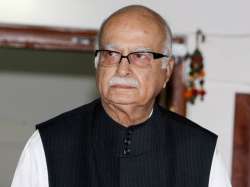The Supreme Court’s decision to revive criminal conspiracy charges against octogenarian BJP leader LK Advani in the Babri mosque demolition case has come as a huge blow for him and the BJP-led government. The list includes senior leaders like Murali Manohar Joshi, cabinet minister Uma Bharti and Governor Kalyan Singh – all who have wield considerable influence in the party at some point or the other.
However, the biggest blow would come to Advani – often referred to as the eternal PM-in-waiting. For the top court’s decision today may put to rest any speculation about Advani being in the race for the post of the next President of India. The court’s decision now makes it difficult for the government to propose his name for the top post.
Advani, who was Deputy PM during the erstwhile NDA government headed by Atal Bihari Vajpayee, was seen as a top contender for the Presidential elections slated to held later this year.
Advani, among the senior most political leader of the country, has served as the Home Minister in the NDA alliance government from 1998-2004. In 2009, he was the BJP’s prime ministerial candidate, but the party had lost the election.
Five years later, Advani was once again the favourite candidate for the post, but was virtually sidelined and Narendra Modi was declared as the BJP’s nominee. At that time, reports of a major rift within the party over Advani’s candidature for the top job did cause unease for the then opposition party. Not to forget that the anointment of Modi as the party’s PM candidate came as no less an embarrassment for Advani himself.
He virtually went missing in action from all party affairs in the run-up to the Lok Sabha polls. Several senior party functionaries were seen making a beeline to meet Advani to try and appease the situation. However, the thumping majority that BJP stormed to power in the elections with came as a stamp of approval for Modi’s popularity. Advani had no option but to remain sidelined as a member of the party’s advisory ‘Margdarshak Mandal’.
His possible projection as the party’s pick for President, thus, would have come as some redemption for the beleaguered leader. However, that does not appear likely now.
The Congress, sensing an opportunity, has pounced upon the development and is seeking the resignation of Uma Bharti as minister and Kalyan Singh as Governor. Kalyan Singh, the present Governor of Rajasthan, is also in trouble. However, former UP CM has been excluded from the charges as he enjoys immunity from prosecution, provided by Article 361 of the Constitution to the President and Governors during their term of office.
Senior party leader Kapil Sibal said that Congress will demand resignation of Uma Bharti and Kalyan Singh.
"It's substantial step forward in the cause of justice. Means the majesty of law has been upheld, happy about that," said Sibal.
“So much of efforts have been made by BJP so that justice is not prevailed. But justice delayed is justice denied. Those BJP leaders who are accused should give their resignation. By doing this they should give the message of mortality. They should also accept what court has said,” said Congress leader Pramod Tiwari.
The attack, though not directly targeted at Advani, does not bode well for his likely candidature as President of India. Charged with criminal conspiracy and the top court’s directions to hear the case on a day-to-day basis could turn his fortunes either way. The BJP’s decision to even project him for the top constitutional post may not augur well for its image as it looks to expand its footprints in the country. The support of allies, too, appears unlikely in the current scenario.
Even otherwise, with the opposition breathing down its neck, the government would do well not to provide an issue to the opposition against the government.
